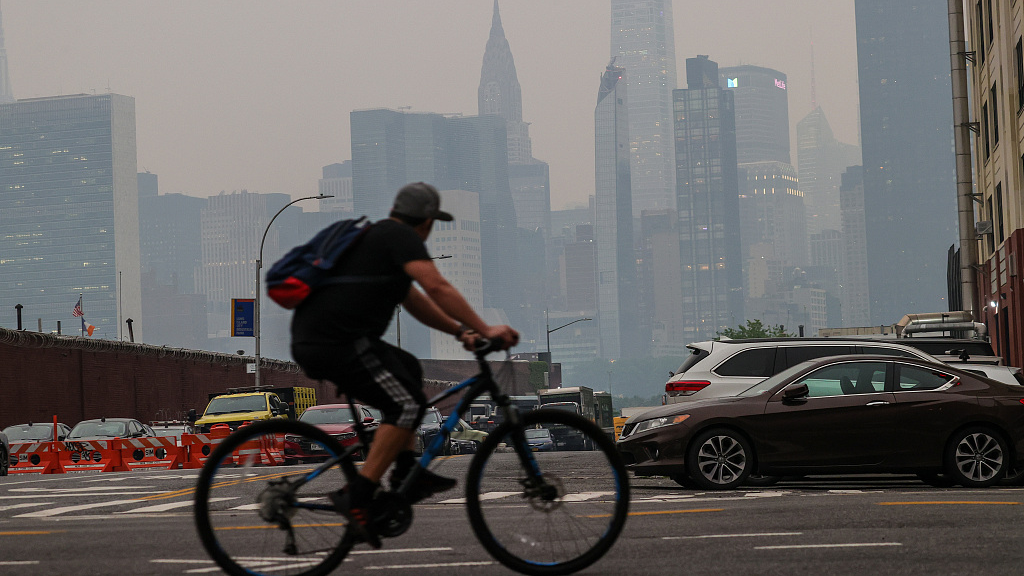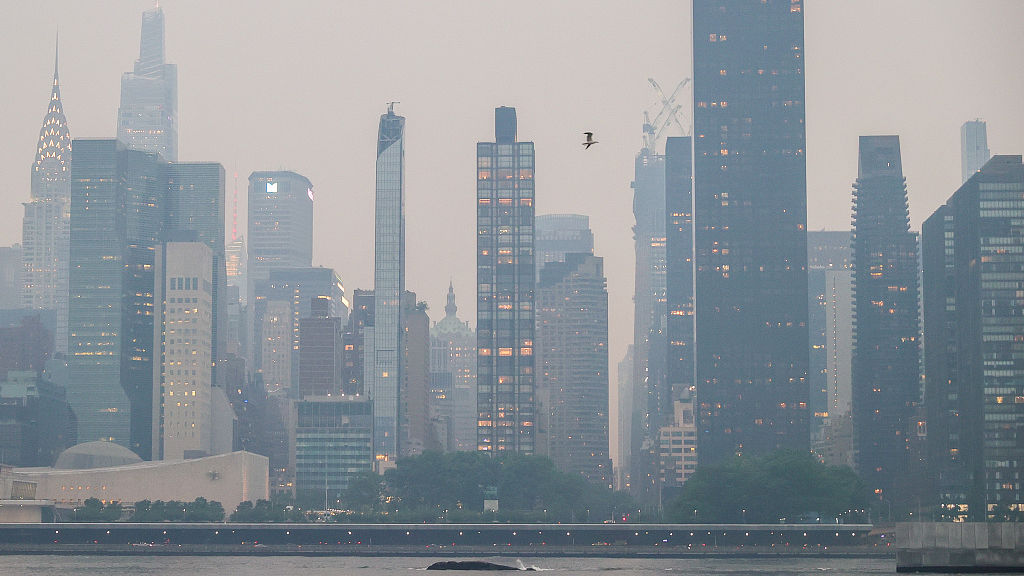
A man rides amid polluted air in New York City, the United States, June 6, 2023. New York City has issued a health advisory for June 6 as smoke from wildfires in Canada impacting the city's air quality. /VCG
A man rides amid polluted air in New York City, the United States, June 6, 2023. New York City has issued a health advisory for June 6 as smoke from wildfires in Canada impacting the city's air quality. /VCG
Editor's note: Bradley Blankenship, a special commentator on current affairs for CGTN, is a Prague-based American journalist, political analyst and freelance reporter. The article reflects the author's opinions and not necessarily the views of CGTN.
The Canadian wildfires, which are tearing through swaths of the North American country in what is described as an ecological catastrophe, are now seriously impacting. Major cities like New York City, Philadelphia and others have had air quality indexes (AQI) this week in the hazardous range, with doctors calling on the public to wear respirators and use air filters. New York alone, a city of nearly 8.5 million people, saw its AQI peak at over 200 on June 6.
Snow Bull Capital CEO Taylor Ogan, who lives in the southern Chinese city of Shenzhen, remarked that his city, with a population three times that of NYC, currently has air ten times cleaner than the Big Apple. The Economist's Don Weinland jumped in by saying that it's essentially a one-off situation because the AQI issue is caused by the fires and that it's nothing to worry about.
But, actually, this isn't a one-off. The reality is that major U.S. cities in the heartland and across both major coasts have seen dangerous smog over recent years due to wildfires. And the incidence and scale of these fires are increasing. That's because the deleterious effects of climate change are getting worse and worse, as the world continues to unload plumes of greenhouse gas into the atmosphere. So this is actually an issue that will (very predictably) get worse.
So this is not a matter of comparison or some petty squabble saying that Shenzhen is just better than New York City. The real issue is that because this — annual uncontrolled wildfires in North America — are the new norm, it must therefore demand a robust policy response from the local, state and federal government to address. This is, after all, a serious public health concern.
Officials need to learn how to deal with the serious impact on AQI brought on by these wildfires, and it may not be too far-fetched to look to China as an example since the country has gone to great lengths to reduce urban air pollution in major cities due to government initiatives and cooperation with private companies.
The unfortunate part of climate change, and where the world stands now, is that policies need to focus not only on cutting emissions but also on preemptively addressing the inevitable effects that we see happening now.
For instance, last summer the United States and Europe were ravaged by extraordinary heat waves. Some 110 million people in half of the U.S.' 50 states were under heat alerts and Europe was so badly hit that the UK Royal Air Force reportedly halted flights at the Brize Norton air base at one point because an airstrip melted. Thousands of people in Spain and Portugal alone died last July due to the high temperatures.

A view of polluted air in New York City, the United States, June 6, 2023. New York City has issued a health advisory for June 6 as smoke from wildfires in Canada impacting the city's air quality. /VCG
A view of polluted air in New York City, the United States, June 6, 2023. New York City has issued a health advisory for June 6 as smoke from wildfires in Canada impacting the city's air quality. /VCG
Last year alone, the U.S. saw 92 all-time record high temperatures set from the beginning of the year through July 16, according to data published by the U.S. National Oceanic and Atmospheric Administration. For the rest of the world, there were at least a total of 188 records broken. This tells you immediately that something is wrong, that this isn't how the climate should manifest naturally and that something must be done.
For much of Northern Europe and the northern United States, in places like Washington State and Oregon, which largely do not have air conditioning units in most buildings, this is an immediate indication that folks ought to get one installed like their southern neighbors. As for traditionally hot locales, the situation is obviously much more complicated and options are limited. In all likelihood, it could be that many of these places become uninhabitable in the coming decades if things continue on the same trajectory.
The issue of AQI in the U.S. is no different: People should take it as a message to invest in air filters and respirators. They'll probably end up needing them, unfortunately. And the state could help people with pre-existing conditions that make them susceptible to poor air quality get the equipment they need, or somehow get it covered by their medical insurance. All options ought to be on the table — but not being prepared cannot be one of them.
The ominous red smoke billowing over America's largest cities should be a clear message to everyone, even those who don't understand the issue of climate change, that action is needed. Again, not only to cut emissions, which is the most obvious talking point for this entire discussion but also to mitigate the worst possible outcomes. Those worst cases are already happening and with more frequency, while each successive disaster displays one message clearly — that America's infrastructure is simply not ready for the world we have created.
(If you want to contribute and have specific expertise, please contact us at opinions@cgtn.com. Follow @thouse_opinions on Twitter to discover the latest commentaries in the CGTN Opinion Section.)